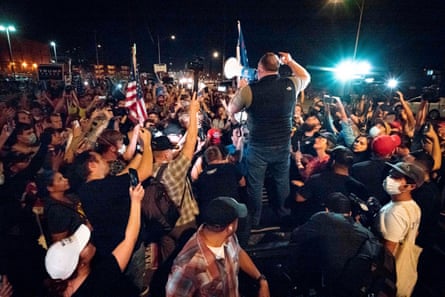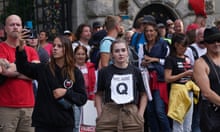In front of a microphone with the cameras on him, Alex Jones looked comfortable on his first day of testimony. The delusional provocateur and conspiracy peddler sauntered to the witness stand in an Austin, Texas, courtroom, shirt unbuttoned without a tie, and introduced himself to the jury with his characteristic, gravelled intonation.
“I actually feel good because I have a chance to say what’s really going on instead of the corporate media and high-powered law firms manipulating what I actually did,” Jones said. “My big frustration is people saying I’m personally going after them, when I question every event.”
Jones, who has stoked dangerous fires of disinformation and distrust on the far right for decades, was facing trial last week to determine how much he owes families of the 2012 Sandy Hook mass shooting – which he long proclaimed was a hoax.
Outside the courtroom last week, a new documentary that casts him as a free-speech activist was released. Throughout, Jones has continued to broadcast lies and disinformation to a huge audience online.
In court, however, he was held to a different standard. After testifying for two days – including a rigorous cross-examination that left Jones sweating and visibly uncomfortable – a Texas jury ordered him to pay a total of $49.3m (£40.8m) in damages to the parents of one of the Sandy Hook victims. He still faces several lawsuits from other families.
The judge, Maya Guerra Gamble, scolded Jones, after he told untruths at least twice on the stand. “It seems absurd to instruct you again that you must tell the truth when you testify, but here I am: you must tell the truth while you testify,” she said. “This is not your show.”
Jones tried to interject, saying he had only said what he believed to be the truth.
“You believe everything you say is true, but it isn’t. Your beliefs do not make something true. That is what we’re doing here,” the judge said.
The new documentary, Alex’s War, was directed by Alex Lee Moyer and made with the cooperation of Jones. It charts his rise from a fringe public-access TV host to leader of rallies on 6 January 2021 that ended in a violent insurrection at the US Capitol.
Jones says in the documentary that he grew up a voracious reader. Starting with comic books and science-fiction, an obsession with history books began when he read Shakespeare’s Julius Caesar. He lists a number of books written about the second world war and the Nazi regime that he read as a young man. Among the ones that most shaped his thinking, he says, was None Dare Call it a Conspiracy, by Gary Allen, a prominent member of the ultraconservative John Birch Society. The book claims that an all-powerful group of businessmen, communists and socialists are secretly trying to take control of the world.
But Jones didn’t take to the airwaves with his conspiracy theories until after the 1993 siege of the Branch Davidian compound outside Waco, Texas, a few hours north of Austin. The botched raid, in which four federal officers and 82 civilians were killed, stirred up anti-government sentiment in many far-right circles. For Jones, it was a call to action.

He began hosting a show on Austin’s public-access television station, where he was a fringe personality who ranted about impending martial law, and began developing the on-air persona that would make him rich later in life.
After the domestic terrorist Timothy McVeigh said he bombed an Oklahoma City federal building in 1995 as retribution for the Waco raid, Jones began interviewing people who claimed the government had staged the attack. Apparently unable to accept that he shared the same view as McVeigh, he rationalised the Oklahoma bombing as a false-flag operation.
He moved his show to Austin’s talk radio station in 1996, and helped raise $93,000 to memorialise the Branch Davidian compound in Waco. His show was cancelled in 1999 because his views made it difficult for the station to find sponsors.
But in the early days of the internet, Jones set up shop in a spare bedroom of his Austin home and started broadcasting online with a new name – Infowars – and sold his show to nearly 100 FM and AM stations across the US.
After the 9/11 attacks, he began spreading more theories that the terrorist attacks were staged. He lost some syndication for his wild views, but online, his popularity continued to grow. “I don’t do it for the monetary thing. I do it for the truth,” Jones said at his trial last Tuesday, “and the monetary thing comes with it because people can tell I’m not reading from a script. I’m not lying like the corporate media on purpose.”
On his regular Infowars show, Jones is bombastic and animated. He gets worked up into fierce diatribes about such matters as demons and politics, fluoride in the water supply and an interlinked global conspiracy that is responsible for everything from Covid to gun control.
During the Obama administration, Jones ramped up racist and virulent rants against the nation’s first Black president. His influence and audience continued to grow, bolstered by, and helping to spread, a bigoted and nationalistic “alt-right” movement.
Jones also continued to spread untrue theories about terrorist attacks, mass shootings and major tragedies, claiming they were false-flag events where paid crisis-actors showed up to promote an agenda from a globalist new world order. “When I say staged, I mean they knew it was going to happen and stood back and let it happen,” Jones testified last week. “That’s what I thought about Sandy Hook.”
Jones purports to be a free speech advocate, and that the lies he spreads are protected by the US constitution. But limits to the first amendment include speech that defames someone or is dangerous.
“In some ways, there is no question that Alex Jones exercises his first amendment right to express himself and raise questions about public events,” says Roy Gutterman, director of the the Tully Center for Free Speech at Syracuse University. “But this case also shows that the law of defamation does limit what false and potentially harmful statements some speakers may make.”

The Southern Poverty Law Center (SPLC), which tracks hate and extremist groups in the US, calls Jones “the most prolific conspiracy theorist in contemporary America”. Michael Edison Hayden, an investigative reporter and spokesman for the SPLC, says Jones’s ability to influence a huge audience makes his speech dangerous. “He is an amusing carnival barker so we kind of ignore many of the things that are staring us right in the face about how hateful he is,” Hayden says. “He has probably done more to further the cause of hate in this country than almost anyone outside of Donald Trump himself.”
Jones has been able to grow his Infowars platform through a lucrative sales model where he hawks specially made products on air, such as a variety of survivalist gear and a line of “overpriced and ineffective” vitamins and supplements. He testified last week that the company raked in $165m in sales between September 2015 and December 2018. “With Jones, fascism is a business,” Hayden says.
As the Infowars audience grew in the lead-up to the 2016 presidential election, Jones also gained a new fan and regular guest: Trump. “He ramps up his grift through the rise of extremist activism under Trump and sort of hitches his wagon of sales to Trump’s rise,” Hayden says. “To me, that’s Jones in his final form, which is just coming from this libertarian, entrepreneurial, conspiracy-obsessed world to becoming something that is much more what we would call fascist.”
Dan Friesen had heard of Alex Jones before the 2016 election, but had mainly seen his conspiracy videos in online rabbit holes, not taking him terribly seriously. The Chicago comedian was surprised to see Jones aligning with Trump.
“I just thought it was kind of like a guy who was trying to hold the system accountable, because that’s the presentation of what the show is,” Friesen says. He began looking into Jones’s broadcasts more. “As we went along, it became so clear how so many of the things that he does are awful. I found so many problems with his ideology, and also the way he abuses information, that I started to take it more seriously.”
Now Friesen co-hosts a podcast, Knowledge Fight, where he breaks down Infowars shows and Jones’s rhetoric. He says that Jones uses the same toolbox of disinformation tactics to mislead listeners. Often, he will share a real headline from a mainstream news outlet on air, but make up what is in the actual article. He also regularly uses illegitimate sources, but tells listeners it is from the “most prestigious” expert.
“It’s just a complete farce of information,” Friesen says. “He doesn’t care about anything except for what he can use to defend the point he intends to make.”
Friesen came to Austin last week to cover the Sandy Hook trial for the podcast. It’s tiring work, he says, but important. He has heard from listeners who say his podcast has helped them reconnect with family members whose relationships have been damaged by the dangerous theories Jones spreads.
“Things like Alex, it’s nonsense and propaganda that has an effect on the real world,” Friesen says. “People are seeing this one way or another, whether or not it’s being given an appropriate critical view.”
The investigations into Jones’s involvement with the 6 January insurrection and Sandy Hook trials could have an impact on Infowars, but it is unlikely Jones will disappear completely. Recently, the SPLC reported that an anonymous donor gave an $8m bitcoin donation to Infowars, despite its parent company filing for bankruptcy during the trial.
“I don’t see what would be stopping him,” Friesen says. “I mean, if your entire existence has been about yelling, for like, 20-odd years, and relishing that attention, I don’t know how you can go away.”
By aligning with Trump, Jones’s popularity and influence grew rapidly. Trump used false and misleading Infowars headlines to prop up his campaign to become president. Jones said on his show that Obama and Hillary Clinton were demons from hell and smelled of sulphur.
In 2017, Jones helped spread the dangerous QAnon conspiracy theory that wrongly posits that Trump was working to overthrow a cannibalistic, satanist, paedophilic cabal that secretly controlled the US government.
Over the next several years, tech platforms began banning Jones and Infowars for spreading misleading information and hate speech against a number of minority groups. Twitter, Facebook, YouTube, Spotify, Apple and others have removed his content and banned his accounts.
Jones supported Trump’s re-election campaign and organised “stop the steal” rallies across the US after he lost. According to the New York Times, he helped fundraise for the rallies on 6 January before the violent insurrection. That day, he participated in the march to the Capitol, and posted an Infowars video saying: “We need to understand we’re under attack, and we need to understand this is 21st-century warfare and get on a war-footing.”
His ties to other far-right groups that organised the insurrection have made him a key witness for the US House’s committee investigating the 6 January attack. Jones sued Congress when he was subpoenaed for his mobile phone records and text messages, but eventually spoke to the committee, invoking his fifth amendment right not to give self-incriminating evidence more than 100 times, according to his lawyers. Later, he sought immunity from federal prosecutors.
During Jones’s testimony last week, attorneys for the Sandy Hook family presented evidence showing he had lied under oath, even though he ultimately admitted the attack was “100% real”. Jones dodged and found ways to talk around questions he didn’t want to answer, while still calling out “corporate media” whenever he had a chance.
But on the sixth day of testimony, before Jones took the stand, the parents of six-year-old victim Jesse Lewis told jurors how Jones had made the past decade even more unbearable. They talked about extended trauma and near-constant fear of attack from Jones’s listeners who believe that they are paid actors and that their son never existed.

“Alex was the one with the match that started the fire,” the boy’s father, Neil Heslin testified. “He had a strong voice and he had a platform and he had power.”
At that moment, Jones was not in the courtroom but in his Austin studio, calling Heslin “slow” and continuing to peddle his inane theories about the 2012 shooting.
When Jones returned from his studio that afternoon, Scarlett Lewis, the boy’s mother, testified that losing her child was like losing a limb. She still has “phantom pains”, she says, like he should be there but is not.
“We went from having a child murdered and this impossible, lifelong journey … but it’s something you can process. This, I can’t,” she said. “It’s this element that’s always in the background, of fear, [that] keeps me from healing.”
The parents testified that Jones’s reach went beyond just unhinged theorists online. Lewis said she has had death threats, and received harassing emails and phone calls from Jones’s listeners. One Christmas, a man pulled up in front of the house and began taking photos of her and the property. Another time, someone drove by firing a gun and shouting “Alex Jones” and “Infowars”. Lewis now sleeps with a knife and a gun nearby.
“Truth, truth is so vital to our world. Truth is what we base a society on,” she testified, speaking directly to Jones across the courtroom. “I think you know that Sandy Hook is real and that it happened, but I don’t think you understand at all the repercussions of going on air with a huge audience and lying … It seems so incredible to me that we have to do this, that we have to implore you – not just implore you, punish you – to stop you from lying.”
Heslin and Lewis were seeking $150m in compensation, but said they were pleased with the verdict. It also emerged last week that Jones’s lawyer had inadvertently passed Jones’s text messages from the past two years to Heslin and Lewis’s attorney, Mark Bankston. The House committee investigating 6 January has requested to see them.
Bankston said,“With punitive damages still to be decided and multiple [other pending legal matters], it is clear that Mr Jones’s time on the American stage is finally coming to an end.”










